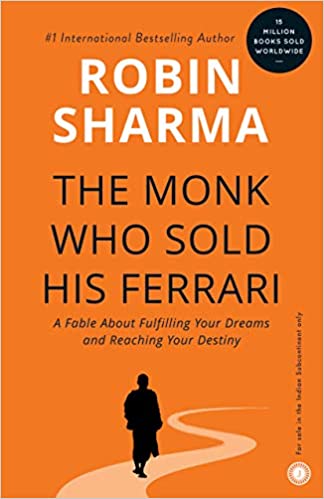Blurb:
A renowned inspirational fiction, “The Monk Who Sold His Ferrari” is a revealing story that offers the readers a simple yet profound way to live life. The plot of this story revolves around Julian Mantle, a lawyer who has made his fortune and name in the profession. A sudden heart-attack creates havoc in the successful lawyer?s life. Jolted by the sudden onset of the illness, his practice comes to a standstill. He ponders over material success being worth it all, renounces all of it and leaves for India. A visit to India about a spiritual awakening that opens up new vistas and Julian begins to view life in a different perspective. He decides to live his life once again but in a way that is much more fulfilling and meaningful than before. In the book, the reader goes through a spiritual journey and into a very old culture that has gathered much wisdom over the millennia.
My Review:
“The Monk Who Sold His Ferrari” by Robin Sharma is a book that delves into various themes such as mindfulness, purpose, time management, and the pursuit of happiness. The author skillfully intertwines these concepts with practical exercises and techniques, offering readers the opportunity to apply them in their own lives. The book presents wisdom from ancient Eastern philosophies alongside modern self-help techniques, making it accessible to a wide audience.
One of the strengths of the book lies in its exploration of universal topics that are relevant to everyone. The principles discussed, such as living in the present moment, practising gratitude, and cultivating self-discipline, are familiar but often neglected in our busy lives. The author’s emphasis on these principles serves as a reminder to prioritize what truly matters.
However, I found the chosen writing style to be somewhat disappointing. The book is neither entirely fiction nor non-fiction, which can be off-putting for some readers. It adopts a preachy tone, resembling an interview format. In comparison to other successful non-fiction books like “Ikigai” and “Atomic Habits,” which deliver their messages concisely, “The Monk Who Sold His Ferrari” seems to overcomplicate its narrative.
Moreover, while the introduction of Indian monks in Sivanna is intriguing, it is not fully utilized as a fictional element. The story shared by the protagonist, involving a naked sumo wrestler, is meant to serve as a mnemonic device to remember the key elements for life improvement but ends up being confusing and distracting.
Despite these drawbacks, the book offers valuable insights for those willing to look beyond its stylistic issues. The wisdom shared within its pages can be easily understood and implemented, making it accessible to readers seeking personal growth. If you are interested in blending ancient Eastern philosophies with practical self-help techniques, this book might be worth exploring.
In conclusion, “The Monk Who Sold His Ferrari” falls short of the hype surrounding it, but it still provides worthwhile lessons for personal development. While the writing style may not resonate with everyone, the core principles discussed are universal and can inspire positive change in readers’ lives.

